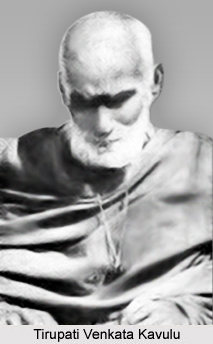 Tirupati Venkata Kavulu is the pen name of a literary partnership in Telugu, comprising Divakarla Tirupati Sastry and Chellapilla Venkata Sastry. Both of them worked as a duo. They were Dramatists and poets. They jointly composed over 100 original works in Telugu language and Sanskrit language, and several translations from Sanskrit literature. Most of them were respected as metrical masters; they received honours from Rajas, zamindars, governments, as well as lay readers. They were gurus of the avadhana, impromptu poetic renderings greatly admired in Andhra Pradesh, and held audiences spellbound by their ready wit and poetic gifts. As dramatists they are famous for idealistic characterization and lyrical verse. Their poems are popular even with illiterate rural boys.
Tirupati Venkata Kavulu is the pen name of a literary partnership in Telugu, comprising Divakarla Tirupati Sastry and Chellapilla Venkata Sastry. Both of them worked as a duo. They were Dramatists and poets. They jointly composed over 100 original works in Telugu language and Sanskrit language, and several translations from Sanskrit literature. Most of them were respected as metrical masters; they received honours from Rajas, zamindars, governments, as well as lay readers. They were gurus of the avadhana, impromptu poetic renderings greatly admired in Andhra Pradesh, and held audiences spellbound by their ready wit and poetic gifts. As dramatists they are famous for idealistic characterization and lyrical verse. Their poems are popular even with illiterate rural boys.
As authors of more than a dozen plays, they were responsible for keeping the musical in high esteem. Among their original scripts, Panditarajamu dramatized the life of the poet Jagannadha Panditaraja. But Edwardu pattabhisheka natakamu insipidly celebrated Edward V`s coronation. Their most important contribution to Telugu theatre lies in their six Mahabharata plays. The name can be mentioned in episodic order as Pandavajananamu i.e. "Pandavas Birth" in 1908, Pandava pravasamu i.e. `Pandavas` Exile` in 1907, Pandava rajasnyam i.e. "Pandavas" Royal Sacrifice in 1921, Pandava iidyogamn i.e. "Pandavas" Endeavour` in 1911, Pandava vijayamu i.e. `Pandavas` Victory` in 1903, and Pandava aswamedhamu i.e. "Pandavas" Horse Sacrifice` in 1903.
Pandava ndyoga vijayalu was a combination of the fourth and fifth. This has for long held sway over the Telugu language stage. Often considered a yardstick for judging an actor`s calibre in the musical theatre, it has had in its cast successive generations of such great actors as Malladi Govinda Sastry, Munjuri Krishna Rao, Bellamkonda Subba Rao, Banda Kanakalingeswara Rao, and Peesapati Narasimha Murty (as Lord Krishna), Madhavapeddi Venkataramaiah, Achanta Venkataratnam Naidu, and Dhulipala Seetarama Sastry, and Pulipati Venkateswarulu (as Arjuna).
Other plays by the twin poets include Sukanya in 1908, Anargha Naradam i.e. "Priceless Narada" in 1909, Dambha Vamanam i.e. "Deceitful Vamana" in 1909, and Prabhavati-Pradyumnamn i.e. "Prabhavati and Pradyumna" in 1931. They also authored five farces, some written in the spoken idiom.
This article is a stub. You can enrich by adding more information to it. Send your Write Up to content@indianetzone.com




















